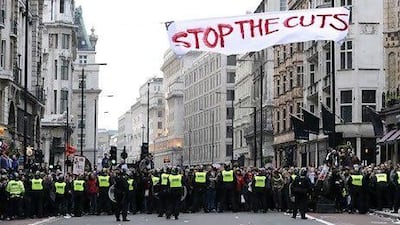The leader of Britain's largest public sector union warned yesterday that the country was facing its biggest wave of industrial action since the 1926 general strike because of government austerity measures.
The threat is just the latest to affect Europe following governments' moves to slash public spending because of mounting budget deficits.
Strikes similar to those that have already crippled the likes of Spain, Portugal and France - and which yesterday continued to lead to violence in Greece - are now threatening to engulf the UK, said Dave Prentis, the general secretary of Unison, whose 1.3 million members mainly work for local authorities and the health service.
The flashpoint in the current dispute is over public-sector pensions with the Conservative-Liberal Democrat coalition government pressing ahead with plans to require most government and local council workers to work longer and to pay more for less generous entitlements in retirement.
Some three quarters of a million teachers and government civil servants plan a one-day strike on June 30 but concerted and, perhaps, indefinite action by unions is not expected until the autumn.
"It will be the biggest since the general strike [when three million public workers struck]," Mr Prentis told The Guardian newspaper. "We are going to win.
"I strongly believe that one day of industrial action will not change anyone's mind in government. We want to move towards a settlement. But we are prepared for rolling action over an indefinite period."
On Friday, Danny Alexander, the chief secretary to the Treasury, infuriated union leaders by telling them that it would be a "colossal mistake" to reject the government's proposals over pensions as it struggles to tackle a record £150 billion (Dh892.38bn) deficit with far-reaching spending cuts, including many thousands of public-sector job cuts.
The proposals on pensions include a phased increase over the next decade in the general retirement age in the public sector from 60 to 66; ending pensions based on final salaries and, instead calculating them on career-average earnings; and raising individuals' contributions by an average 3.2 per cent.
"You can't just look at what's happening around pensions as a single issue," Mr Prentis said. "You look at what this coalition has decided to do to reduce the deficit and it's decided that most of the deficit reduction programme will be at the expense of our public services.
"The people that we represent are facing redundancy and a two-year pay freeze, while inflation is 5 per cent and gas prices are going up 20 per cent, and they are desperately worried about privatisation of the services they have committed their working lives to."
Brendan Barber, the general secretary of the Trades Union Congress - the umbrella organisation representing 58 unions with more than 6 million members - told the BBC yesterday that Mr Prentis was reflecting the "real anger" being felt across the union movement.
"I want to see this resolved by negotiation but if the government are determined to push through a huge attack on people's pension entitlement, they are not prepared to negotiate in a sensible, reasonable, fair-minded way, then the unions will have no option open to them other than to try to defend their members through industrial action," he said.
Mr Barber said he believed there was "very strong, broad public support" for action by the unions.
"I don't think the wider public see their public service colleagues in the way that some people like to portray them," he said.
"The nurses and healthcare workers in our hospitals, the teachers in our schools, the carers who look after the elderly and infirm - they don't see these people as the kind of parasites some media commentators present public servants to be."
The government, however, seems ready to stick to its guns simply because the country cannot afford the escalating cost of public-sector pensions, not least because retirees are now living a decade longer than they were a generation ago.
Business leaders are urging the coalition to ignore the strike threats and insist that public-sector workers will continue to enjoy generous retirement deals even after the proposed changes.
The Confederation of British Industry has said the proposed cuts to "gold-plated" schemes would still leave millions of public employees with pensions far out of reach for most private-sector workers.

